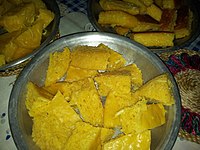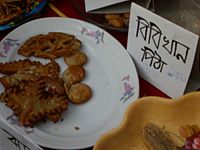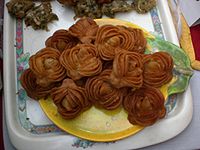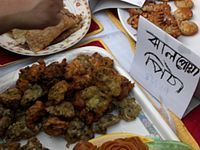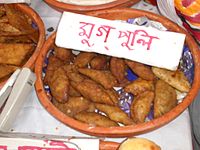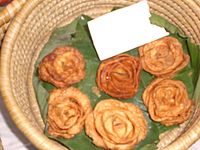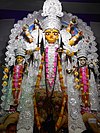Pitha
This article needs additional citations for verification. (April 2020) |
 Chitoi Pitha | |
| Course | Whole meal, snack or dessert |
|---|---|
| Place of origin | Assam, Odisha, Bengal region, Nepal, Jharkhand, Bihar |
| Associated national cuisine | Assamese cuisine, Odia cuisine, Bengali cuisine |
| Main ingredients | Rice flour or wheat flour |
Pithas are a variety of food similar to pancakes, dumplings or fritters, originating from the Indian subcontinent, common in Bangladesh and India. Pitha can be sweet or savoury, and usually made from a dough or batter, which is then steamed, fried or griddled. Very few varieties are oven-baked or boiled, and most are unleavened and cooked on a stovetop (or equivalent). Some versions may have a filling, garnish, or sauce. Few may be set or shaped after cooking. They are typically eaten as a snack with chai, or as treats during special occasions (similar to mithai).
Pitha is especially popular in Bangladesh and the eastern Indian states of Bihar, Jharkhand, Odisha, West Bengal, the South Indian state of Kerala, and the Northeast Indian states, especially Assam. Pithas are typically made of rice flour, although there are some types of pitha made of wheat flour. Less common types of pitha are made of palm or ol (a local root vegetable).
Preparation[edit]
Pithas are primarily made from a batter of rice flour or wheat flour, which is shaped and optionally filled with sweet or savory ingredients. When filled, the pitha's pouch is called a khol (literally "container") and the fillings are called pur.
For stuffed vegetable pithas, ingredients such as cauliflower, cabbage, radish, or potato are usually fried, baked, or steamed, and then mashed, cooled, and formed into small balls to stuff into the pithas.
Sweet pithas typically contain sugar, jaggery, date juice, or palm syrup, and can be filled with grated coconut, fried or roasted sesame seeds, cashews, pistachios, sweetened vegetables, or fruits. Sweet pithas are also often flavored using cardamom or camphor.
Depending on the type of pitha being prepared, pithas can be fried in oil or ghee, slow-roasted over a fire, steamed, or baked and rolled over a hot plate.
Pithas are often eaten during breakfast, as a snack with (often with tea), and in dinner or lunch. Although there are many sweet varieties that are reserved for desserts or holidays.
Different pithas from each region[edit]
Pithas vary considerably across the regions of the eastern Indian subcontinent.
In Assam[edit]
In Assam, pitha is a special class of rice preparation generally made only on special occasions like Bihu. Assamese pithas are often made from bora saul, a special kind of glutinous rice, or xaali saul, or sun-dried rice. Some pithas commonly found in Assam include the following:
- কাঁচি পিঠা Kachi pitha (lit. "Sickle pitha"): a pan baked pancake made from bora saul and filled with sesame seeds, ground coconut, dried orange rind, and jaggery. The sickle is known as " Kachi" in Assamese and hence the name.
- ঘিলা পিঠা Ghila pitha (lit. "knee pitha"): a fried pitha made from bora saul and jaggery. Salt can also be used instead of jaggery for a savory variant.
- চুঙা পিঠা Sunga pitha: a special pitha made with both xaali saul and bora saul, which are mixed with water and jaggery and churned thoroughly before being placed in a young bamboo tube corked with banana leaf and roasted in fire. The resulting tube-shaped cake is then cut into pieces and served with hot milk.
- টেকেলি পিঠা Tekeli pitha (lit. "earthenware pitha"): a special pitha made with both xaali saul and bora saul, mixed with coconut, sugar, and powdered milk. Ground cardamom and dried orange rind can also be added. The pitha is steamed in an earthenware pot or a kettle set on a hearth.
- উহোৱা পিঠা Uhuwa pitha: Rice flour of Xaali Saul and Bora Saul is mixed with jaggery or salt and water and churned thoroughly. The paste is rolled into small balls and flattened and then boiled in water. It is served with tea and also can be eaten with milk.
- কেটলি পিঠা Ketli pitha: The method of preparation, as well as the substance, is as same as tekeli pitha, but a kettle is used here instead of the earthenware. That is the reason it is called Ketli pitha (Ketli in Assamese means kettle). Here the kettle-cork is kept upside down on the kettle and the substance is put on it. It usually takes less time to be baked than tekeli pitha takes.
- তিল পিঠা Til pitha: This is made with sesame and rice. The rice flour is spread in a circle on a pan, basically made of cast iron and heated. The roasted sesame seeds are placed in the circle along with sugar or jaggery and rolled. These are cylindrical shaped, more like a cigar.
- তেল পিঠা Tel pitha this is a pitha which is fried in oil.
- নাৰিকল দিয়া পিঠা বা নাৰিকলৰ পিঠা Narikol diya pitha
- সুতুলি পিঠা Xutuli pitha
- ধূপ পিঠা Dhup pitha, also known as Bhapa pitha
- ভাপতদিয়া পিঠা Bhapotdiya pitha
- লখিমী পিঠা Lakhimi pitha
- তৰা পিঠা Tora pitha
- মুঠিয়া পিঠা Muthiya pitha
- খোলাচাপৰি পিঠা Kholasapori pitha
- লস্কৰা Laskara
- আঙুলি পিঠা Anguli Pitha: In Assamese language, ‘anguli’ means finger while ‘pitha’ is a type of rice cake. ‘Anguli Pitha’ has got its name from the fact that the pithas are shaped like fingers.[1]
In Odisha[edit]
In Odisha, Pithas (Odia: ପିଠା) are special delicacies in an Odia home. On traditional festivals, sweet pithas form a part of the celebrations. Pithas are also routinely prepared and served in Odia homes in normal days. The pitha may be broadly put in the category cakes. Some pithas may also be savoury in taste. Some Odia pithas include the following:
- Arisa Pitha (Odia: ଆରିସା ପିଠା): deep-fried pitha made from rice flour with jaggery or sugar.
- Manda Pitha (Odia: ମଣ୍ଡା ପିଠା): steamed or deep-fried pitha made from rice flour or semolina, often with grated coconut and jaggery/sugar filling or fresh cheese (chhena) filling. A manda pitha without filling is called "Suanli" (Odia: ସୁଆଁଳି).
- Kakara pitha (Odia: କାକରା ପିଠା): very popular fried pancake made from wheat flour/semolina, often with a sweet coconut filling.
- Enduri Pitha (Odia: ଏଣ୍ଡୁରି ପିଠା): pitha made from rice flour and black gram, often with a jaggery and coconut or cheese filling, steamed in a turmeric leaf. Enduri pitha is a special delicacy of the Prathamastami festival.
- Chakuli Pitha (Odia: ଚକୁଳି ପିଠା): thin/thick pancake (set dosa) made from fermented rice and black gram, often eaten for breakfast. Thinner varieties are called saru chakuli, and resemble plain dosas. Often served with dalama (Odia: ଡାଲମା) (vegetable mixed with pulses)nadia chatni (coconut chutney) or kheeri (Odia: ଖିରି), a rice dish.
- Poḍo piṭha (Odia: ପୋଡ଼ ପିଠା) (lit. "burnt pitha"): slow-cooked pitha made from fermented rice and black gram, with chopped coconut. Its crust is slightly burnt, while the inside is soft and white, mostly during Raja Parba.
- Ruka Pitha (Odia: ଋକା ପିଠା): After the leftover of arisa paste, water is added to it to make it thin and pour it into oil which is known as "Rukeiba" not "Andaleiba" and hence Ruka pithaa is made. It is softer than arisa at the middle of it and very crispy at the corner.
- Chitau piṭha (Odia: ଚିତଉ ପିଠା): fried pancake made from rice flour, coconut, and milk, often offered in pujas to Lord Jagannath on Chitalagi Amabasya Pitha(or Chitau Amabasya Pitha).
- Gaintha godi (Odia: ଗଇଁଠା ଗୋଡ଼ି): Small balls made of rice flour dipped in seasoned sweet milk.
- Karanji pitha (Odia: କରଞ୍ଜି): A dumpling made of maida and stuffed with coconut, cashew raisins and fried in ghee.
- Malpua pitha(Odia: ମାଲପୁଆ): Sweetened deep-fried batter of a mixture of bananas and flour
- Suji Kakara Pitha (Odia: ସୁଜି କାକରା ପିଠା): A sweet dish made of suji with coconut stuffing
- Tala Pitha (Odia: ତାଳ ପିଠା): A sweet dish made of palm fruit and rice batter
- Chunchipatra Pitha (Odia: ଛୁଞ୍ଚିପତ୍ର ପିଠା): A pitha made by sprinkling the batter onto a kadai/pan and putting a stuffing made of grated coconut, jaggery/sugar, elaichi.
In Bihar[edit]
Pitha (Devanagari: पिट्ठा) is also the part of Bihari cuisine particularly in Mithila region of Bihar. Mainly the rice flour pitha is popular in Bihar and two varieties of stuffed (sweet or salty stuffing) or unstuffed pitha are consumed.
In Bangladesh, West Bengal, Tripura[edit]
While some pitha can be made at any time of the year in Bengal (Bangladesh and Indian states of West Bengal, Tripura, Assam, Mizoram, Nagaland, Meghalaya, Manipur, Orissa, Jharkhand and Bihar), there are special pitha strongly associated with harvest festivals such as Nabanna (Bengali: নবান্ন nôbanno, literally "new rice" or "new food") and the Poush parbon or Makar Sankranti, celebrated on January 14 every year. During the autumn and winter seasons, festivals dedicated to pitha called pitha mela or pitha utshob are held locally all over Bangladesh.
Some common ingredients in pitha are rice flour, milk, coconut and jaggery. It is often served with sweet syrups such as date tree molasses (Bengali: খেজুরের গুড় khejurer guṛ). A few of the most common pitha found in Bengal include the following:
- তেলের পিঠা Teler piṭha (lit. "oil pitha"), also known as Guror Handesh or simply as Handesh is a Pitha which originated in Sylhet, Bangladesh.
- নুনের পিঠা Nuner pitha (lit. “The pitha of salt.”) is generally a mixture of water, Onions, Gingers, Turmeric powder, Salt, Coriander leaves, Chilli pepper and rice flour, after adding the rice flour the mixture will turn into dough after which it’s smashed down and cut into circles. Nuner Pitha originated from Sylhet.
- সিঈারা Shingara is a Bangladeshi version of a samosa, though a shingara is just a variant of samosa. Some do consider this a Pitha.
- ভাপা পিঠা Bhapa piṭha (lit. "steamed pitha") or dhupi
- পাকন পিঠা Pakan piṭha is a small piece of special dough with the artistic symbols of generally a leaf or a flour fried and soaked with shira (sauger water with cardamom)
- পুলি পিঠা Puli piṭha: a dumpling like dish with brads in the end and stuffed with a coconut mixture or kheer.
- বেনি পিঠা Beni piṭha (lit. "braid pitha")
- দুধের পিঠা Dudher piṭha (lit. "milk pitha") or ভিজা পিঠা bhija piṭha (lit. "wet pitha")
- চন্দ্র পুলি Chôndro puli
- মুগের পুলি Muger puli
- দুধ পুলি Dudh puli
- নকশি পিঠা Nokshi pitha (lit. “The Pitha of artistic patterns”) is a piece of special dough sculpted into art via a bamboo stick or a small metal plate moulded into a v shape, this Pitha is a beautiful piece of art originating from the rural part of Bangladesh.
- পাটিসাপটা পিঠা Paṭi shapta or Patibola পাটিবলা (thin crepes stuffed with jaggery and coconut)
- তালের পিঠা Taler pitha (lit. “palm pitha”) is a Pitha that can be made in many ways, it can be fried, steamed, made with batter and more but it always has to be made with Asian palmyra palm fruits. Taler Pitha has many varieties and each originating from a different place in Bengal such as the batter version of Taler Pitha and Taler Bibi khan Pitha which originated from Bangladesh and some other versions which originated from other parts of Bengal such as West Bengal, Tripura, Assam, Mizoram, Nagaland, Meghalaya, Manipur, Orissa, Jharkhand and Bihar.
- তালের বিবি খান পিঠা Taler Bibi khan Pitha is a type of Bibi khan Pitha and a type of Taler pitha.
- তালের ভাপা পিঠা Taler Vapa Pitha (lit. “steamed palm Pitha”) is a type of Taler Pitha and Bhapa piṭha.
- মুগ পাকন Mug pakon is a Pitha that has artistic symbols moulded on top and bottom of it and it’s soft since it‘s soaked with shira ( sugar water with cardamom mixed with it).
- গোকুল পিঠা Gokul Pitha Is a special dough fried and then soaked with a special type of shira.
- Chui Pitha or Chutki Pitha (Traditional Old Dhaka Pitha)
- চিতই পিঠা Chitoi Pitha is a pancake like dish made with batter, to make a Chitoi Pitha you need to have a special Chitoi Pitha pan where the batter is generally dropped for he mould to form. Chitoi Pitha Is generally eaten with kacha morich bhorta and other spicy bhortas.
- পাতা পিঠা Pata pitha (lit. “leaf Pitha”) is a type of leaf shaped Nokshi pitha.
- লবঙ্গ লতিকা Lonbongo Lotika (lit. “clove lotika”)
- বিবি খান পিঠা Bibi khan Pitha is a steamed Pitha That looks like a cake. Bibi khan Pitha originated in the Bikrampur district, Dhaka, Bangladesh.
- জামাই পিঠা Jamai pitha (lit. “husband Pitha”) is a batter which is moulded into a shape of a flour and fried. This Pitha originated in Bangladesh.
There are thousands of different pithas in every region of Bengal these are just a few pithas from a few regions of Bengal.





